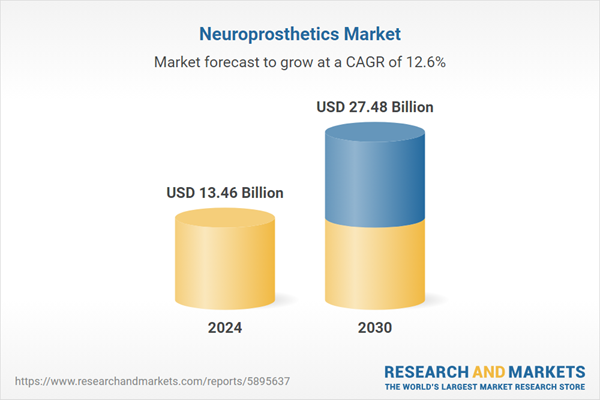Speak directly to the analyst to clarify any post sales queries you may have.
10% Free customizationThis report comes with 10% free customization, enabling you to add data that meets your specific business needs.
A key growth driver is the rising prevalence of neurological disorders - such as Parkinson’s disease, epilepsy, spinal cord injuries, and stroke - particularly among aging populations. As the incidence of these conditions increases, so does the demand for advanced, patient-centric neuroprosthetic solutions.
Breakthroughs in technologies like brain-computer interfaces (BCIs) and neural implants are opening new avenues for treatment and rehabilitation, transforming how neurological conditions are managed. Enhanced funding from public and private sectors, along with supportive regulatory frameworks, is fostering a dynamic ecosystem for research, development, and commercialization.
Key Market Drivers
Rising Prevalence of Neurological Disorders
One of the primary drivers of growth in the neuroprosthetics market is the increasing global burden of neurological disorders. These include a wide array of conditions such as Parkinson’s disease, epilepsy, Alzheimer’s disease, spinal cord injuries, and stroke.The global aging population is a significant contributor to this trend. According to the United Nations' World Population Ageing 2023 report, the number of individuals aged 65 and older is expected to rise sharply in the coming decades. For example, in the United States, the Population Reference Bureau projects that the population aged 65 and above will grow from 58 million in 2022 to 82 million by 2050 - a 47% increase. Given the higher prevalence of neurodegenerative conditions among older adults, this demographic shift is expanding the potential user base for neuroprosthetic devices.
Key Market Challenges
Biocompatibility and Safety Concerns
Biocompatibility and safety remain critical challenges in the neuroprosthetics sector. These devices, which interact directly with the nervous system, must be designed to integrate seamlessly with biological tissues to prevent adverse immune responses and ensure long-term efficacy.One major issue is the potential for immune rejection, where the body identifies the implanted device as a foreign object, leading to inflammation, discomfort, or even device failure. Ensuring that materials used are non-reactive and biocompatible is essential to mitigating these risks.
Another concern involves infection, especially with devices that include external components penetrating the skin barrier. Such infections can compromise both the function of the device and patient health, underscoring the importance of hygienic design and high-quality materials.
Long-term reliability is also paramount. Over time, device degradation due to wear, corrosion, or material fatigue can impair performance and safety. This necessitates continuous monitoring, periodic maintenance, and, in some cases, eventual replacement of the device.
Key Market Trends
Advancements in Brain-Computer Interfaces (BCIs)
Technological advancements in brain-computer interfaces (BCIs) are reshaping the neuroprosthetics landscape. BCIs facilitate direct communication between the brain and external devices, offering transformative solutions for individuals with neurological impairments.Non-invasive BCIs, typically based on electroencephalography (EEG), are gaining traction due to their ease of use and growing accessibility. These devices allow users to interact with computers or prosthetic limbs via thought alone, without requiring surgical intervention. Their potential applications extend beyond healthcare into areas such as assistive technology, gaming, and communication.
In parallel, invasive BCIs are advancing significantly. These systems involve implanting electrodes within the brain, enabling precise data capture and neural stimulation. Innovations in electrode design, implantation techniques, and data processing have greatly improved the accuracy, safety, and durability of these systems. Invasive BCIs are being explored for applications including limb restoration, neurological therapy, and cognitive enhancement.
Emerging hybrid BCIs - combining both invasive and non-invasive elements - seek to balance precision and usability. These systems aim to deliver high-performance control while minimizing surgical risks, offering a promising middle ground for future solutions.
Key Market Players
- Medtronic PLC
- LivaNova PLC
- Demant A/S
- MED-EL Corporation
- Cochlear Limited
- Abbott Laboratories
- Boston Scientific Corp
- Second Sight Medical Products, Inc.
- Retina Implant AG
- NeuroPace Inc
Report Scope:
In this report, the Neuroprosthetics Market has been segmented into the following categories, in addition to the industry trends which have also been detailed below:Neuroprosthetics Market, Type:
- Output Neural Prosthetics
- Input Neural Prosthetics
Neuroprosthetics Market, Technique:
- Spinal Cord Stimulation
- Deep Brain Stimulation
- Vagus Nerve Stimulation
- Other Techniques
Neuroprosthetics Market, Application:
- Parkinson's Disease
- Alzheimer's Disease
- Epilepsy
- Auditory Processing Disorders
- Ophthalmic Disorders
- Other Applications
Neuroprosthetics Market, By Region:
- North America
- United States
- Canada
- Mexico
- Europe
- Germany
- United Kingdom
- Italy
- France
- Spain
- Asia Pacific
- China
- India
- Japan
- South Korea
- Australia
- South America
- Brazil
- Argentina
- Colombia
- Middle East & Africa
- South Africa
- Saudi Arabia
- UAE
Competitive Landscape
Company Profiles: Detailed analysis of the major companies present in the Neuroprosthetics Market.Available Customizations:
With the given market data, the publisher offers customizations according to a company's specific needs. The following customization options are available for the report.Company Information
- Detailed analysis and profiling of additional market players (up to five).
This product will be delivered within 1-3 business days.
Table of Contents
Companies Mentioned
- Medtronic PLC
- LivaNova PLC
- Demant A/S
- MED-EL Corporation
- Cochlear Limited
- Abbott Laboratories
- Boston Scientific Corp
- Second Sight Medical Products, Inc.
- Retina Implant AG
- NeuroPace Inc
Table Information
| Report Attribute | Details |
|---|---|
| No. of Pages | 181 |
| Published | April 2025 |
| Forecast Period | 2024 - 2030 |
| Estimated Market Value ( USD | $ 13.46 Billion |
| Forecasted Market Value ( USD | $ 27.48 Billion |
| Compound Annual Growth Rate | 12.6% |
| Regions Covered | Global |
| No. of Companies Mentioned | 10 |









